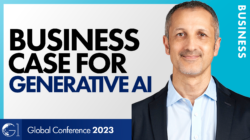Leading High Performing Remote Teams
How can leaders ensure that performance remains high in remote or hybrid-work environments?
Content Marketing
In this course, you’ll learn how compelling blogs, videos, podcasts, and other media can reach customers and drive sales. You’ll also learn steps for creating an effective content marketing plan, and some important ways to measure its impact and success.
Content marketing is a essential digital marketing strategy for companies looking to provide relevant and useful information to support your community and attract new customers.
Get started on your content marketing journey today.
Sustainable Innovation in Times of Disruption: Choices for a Better Society
There are opportunities for progress all around us. The key is to innovate on these opportunities sustainably.
To help identify most effective path forward, you'll need to gain a global perspective to these challenges in an open discussion. How can Japan and the world take action to create a more sustainable, innovative world? Where do you fit in?
It's time to find out.
Social Media & Digital Communications: Impact on Global Public Opinion
Social and digital media have dominated the communications industry for decades. But it's no secret that social media has the power to sway public opinion, and the way in which many companies use these platforms could be seen as manipulative.
What do companies need to be aware of when utilizing social and digital media? How can these mediums be used to better communicate strategically with the world?
Discover what top media and communications experts have to say.
CAGE Distance Framework
Want to expand overseas? The CAGE distance framework can help ensure you're constructing a solid global strategy in four areas: cultural, administrative, economic, and geographic. Learn how to leverage useful differences between countries, identify potential obstacles, and achieve global business success.
Servant Leadership
There's more to leadership than driving a team to profit. In fact, there's a word for looking beyond self-interest to prioritize individual growth: servant leadership. Try this course for a quick breakdown of what that is, how it works, and how it can lead to organizational success.
Strategy: Creating Value Inside Your Company
Have you ever wondered why certain companies are more successful than others? The answer is strategy: internal processes that control costs, allocate resources, and create value. This course from GLOBIS Unlimited can give you the tools you need for that strategic edge.
Strategy: Understanding the External Environment
To plan strategy on any level, you need to understand your company's external environment. In fact, your level of understanding can impact hiring, budgeting, marketing, or nearly any other part of the business world. Want to learn how to do all that? This course from GLOBIS Unlimited is the perfect first step!
Using Japanese Values to Thrive in Global Business
Japanese companies have unique cultural, communication, and operational challenges. But they also have values that have led to remarkable longevity. Check out this seminar to hear how these values help earn trust from overseas head offices and develop employees.
Marketing: Reaching Your Target
Every company works hard to get its products into the hands of customers. Are you doing everything you can to compete? In this course, you’ll find a winning formula to turn a product idea into real sales. Follow along through the fundamentals of the marketing mix and see how companies successfully bring products to market.
Basic Accounting: Financial Analysis
Want to compare your performance vs. a competitor? Or evaluate a potential vendor? Then you'll need to conduct a financial analysis. This course will teach you how to use three financial statements and evaluate financial performance in terms of profitability, efficiency, soundness, growth, and overall strength.
Career Anchors
What drives you to be good at your job?
Career anchors are based on your values, desires, motivations, and abilities. They are the immovable parts of your professional self-image that guide you throughout your career journey.
Try this short GLOBIS Unlimited course to identify which of the eight career anchors is yours!
Leadership with Passion through Kokorozashi
The key ingredient to success? Passion.
Finding your kokorozashi will unify your passions and skills to create positive change in society. This GLOBIS Unlimited course will help you develop the values and lifelong goals you need to become a strong, passion-driven leader.
You’ve scoured job posting boards, carefully tailored your resume, and filled out countless applications. At long last, you’ve heard back from one of the companies that they’d like to schedule an interview. In preparation, you seek out as much interview advice as you can find. But how much of it is actually good advice?
There is no shortage of “time-honored” interview advice out there, but not all advice stands the test of time. What if the interview advice you’ve been relying on is actually hurting your chances of landing the job? What should you be doing instead?
Francis Fung, professional career mindset coach, shares some of the most commonly accepted bad interview advice—and how you can correct it to nail your next job interview.
“The recruiter, or the interviewer, or the company is looking for a specific person to fill a specific role and problem. You just have to be the person who can solve the problem.”
Francis Fung
Transcript:
Bad Interview Advice #1: “Always wear a suit.”
Francis Fung:
When it comes to worst advice for interviews, one of these would be “Always wear a suit. Better to be overdressed than underdressed.” That’s not always correct. It really does depend on the company or the culture that you’re applying for. If you’re applying for somewhere where the culture is casual, fun, and easy, and you turn up in a suit? Yes, you might think, “But I’m more than fully prepared!” But also the interviewer might think, “You don’t know what the company culture is about, and you haven’t even bothered to check out the company.” Therefore, you’re absolutely inappropriately dressed.
What I would suggest is to go and check out, of course, the company website, any career review sites like Glassdoor . . . See what the culture’s like, and just be one or two steps a little bit more prepared or overdressed than what people are wearing at the company.
Bad Interview Advice #2: “Always arrive early.”
Another bad piece of interview advice is “Always arrive extremely early.” That is not always correct. And why I say that is because there have been so many times where I’ve been interviewing people and they have arrived 30 minutes, 45 minutes early just because they feel, “I can wait in the office, right?” Or, “You guys would be able to finish sooner.” Or, “Somehow you’ll be okay to accommodate me.” It’s absolutely not the case.
If the company that you’re interviewing for is busy, and if they’re productive, they’ll probably be in a meeting just before then, or they’ll probably be doing their work. And if you arrive 30 minutes early, they then have to stop. It’s a burden for them. It’s a hassle. They have to go tell you to go somewhere. They have to interrupt their calls. It’s much more trouble than it’s worth. If you want to be safe and you want to avoid any delays, arrive in the area early, but find a café nearby, go relax, and just turn up five minutes before the expected time where you’ll both be ready and it’ll be hassle-free for everyone.
Bad Interview Advice #3: “Describe your strength as a weakness.”
Another piece of bad interview advice [comes] when someone says, “What’s your weakness?” And we all know, and we’ve all heard [that you should] try to describe your strength, but in a way as a weakness: “I don’t have any weaknesses!” or, “I’m a perfectionist!” or, “I work too hard!” It may seem like you’re trying to cover up your strength as a weakness, but it also comes across as fake. And it doesn’t actually tell me anything about yourself.
What I would rather suggest is whenever anyone asks, “What’s your weakness?”—be honest. Tell them a weakness, but also tell them how you’re working on it. And so in that way, you are self-aware, you know what you need to work on, but you also notice steps on how to work on it. That answer is much more valuable for both of you.
Next Article
7 Presentation Skills to Give You an Edge in Your Next Job Interview
Searching for Your Dream Career? Expect the Unexpected
The 3 Worst Things to Say in a Presentation
Bad Interview Advice #4: “Just be yourself.”
Another piece of advice—which some may consider as bad advice—is “Be yourself.”
Now, this one we have to be very careful on. I absolutely agree that you shouldn’t try to be someone that you’re not, or be fake, or lie, but being yourself isn’t always best in an interview situation. Now, why I say that is because the recruiter, or the interviewer, or the company is looking for a specific person to fill a specific role and problem. You just have to be the person that can solve the problem—that’s who they’re looking for.
It doesn’t mean that you should be untrue or unhappy, but don’t just turn up and be your usual self as if you’re hanging around with your friends. Because the interviewer is looking for a very specific type of person.
Bad Interview Advice #5: “Just wing it.”
One really big wrong piece of interview advice is “Just wing it! Play it by ear! You’ll be fine!” Trust that you’ll be fine, yes, but don’t always wing it.
Always do your research for that company, for the interviewer—especially when it comes to the company, its purpose, its competitors, its products. Don’t just try to guess on the spot because it just shows you’re very unprepared and you don’t know what you’re talking about.
Bad Interview Advice #6: “Don’t follow up too quickly.”
So a common misconception about interviews is “Don’t follow up so quickly because it sounds like you’re desperate” or, “it seems like you’re too pushy and desperate.” That’s wrong. It’s absolutely wrong.
You should always, after the interview, send a thank you note to say how you appreciated their time, thank them for having you today, and also you just want to clarify the next steps. Not only is it nice for someone to receive a thank you note, but it also shows that you are actually caring. [It shows] that you want the role and that you are organized enough to actually want to know what are the next steps—what’s the next timeline.
Bad Interview Advice #7: “Don’t ask questions until the end.”
Another interview misconception that people have is “Don’t ask questions until the end.”
Questions at the end has two potential dangers. One is that you’ve forgotten what questions you want to ask, and the second is that you seem disinterested throughout the whole interview because you didn’t ask any questions. Why I would encourage asking questions is because you want to actually turn that interview into more of a chat, into more of a discussion between the interviewer and yourself. And the only way to do that is to engage. Ask questions, keep it friendly, keep it informative and conversational. And so that’s why yes, you should ask questions in an interview.





